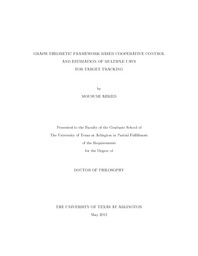
ATTENTION: The works hosted here are being migrated to a new repository that will consolidate resources, improve discoverability, and better show UTA's research impact on the global community. We will update authors as the migration progresses. Please see MavMatrix for more information.
Show simple item record
| dc.contributor.author | Ahmed, Mousumi | en_US |
| dc.date.accessioned | 2012-07-25T19:22:29Z | |
| dc.date.available | 2012-07-25T19:22:29Z | |
| dc.date.issued | 2012-07-25 | |
| dc.date.submitted | January 2012 | en_US |
| dc.identifier.other | DISS-11691 | en_US |
| dc.identifier.uri | http://hdl.handle.net/10106/11140 | |
| dc.description.abstract | Designing the control technique for nonlinear dynamic systems is a significant challenge. Approaches to designing a nonlinear controller are studied and an extensive study on backstepping based technique is performed in this research with the purpose of tracking a moving target autonomously. Our main motivation is to explore the controller for cooperative and coordinating unmanned vehicles in a target tracking application.To start with, a general theoretical framework for target tracking is studied and a controller in three dimensional environment for a single UAV is designed. This research is primarily focused on finding a generalized method which can be applied to track almost any reference trajectory. The backstepping technique is employed to derive the controller for a simplified UAV kinematic model. This controller can compute three autopilot modes i.e. velocity, ground heading (or course angle), and flight path angle for tracking the unmanned vehicle. Numerical implementation is performed in MATLAB with the assumption of having perfect and full state information of the target to investigate the accuracy of the proposed controller. This controller is then frozen for the multi-vehicle problem.Distributed or decentralized cooperative control is discussed in the context of multi-agent systems. A consensus based cooperative control is studied; such consensus based control problem can be viewed from the algebraic graph theory concepts. The communication structure between the UAVs is represented by the dynamic graph where UAVs are represented by the nodes and the communication links are represented by the edges. The previously designed controller is augmented to account for the group to obtain consensus based on their communication. A theoretical development of the controller for the cooperative group of UAVs is presented and the simulation results for different communication topologies are shown. This research also investigates the cases where the communication topology switches to a different topology over particular time instants. Lyapunov analysis is performed to show stability in all cases.Another important aspect of this dissertation research is to implement the controller for the case, where perfect or full state information is not available. This necessitates the design of an estimator to estimate the system state. A nonlinear estimator, Extended Kalman Filter (EKF) is first developed for target tracking with a single UAV. The uncertainties involved with the measurement model and dynamics model are considered as zero mean Gaussian noises with some known covariances. The measurements of the full state of the target are not available and only the range, elevation, and azimuth angle are available from an onboard seeker sensor. A separate EKF is designed to estimate the UAV's own state where the state measurement is available through on-board sensors. The controller computes the three control commands based on the estimated states of target and its own states. Estimation based control laws is also implemented for colored noise measurement uncertainties, and the controller performance is shown with the simulation results.The estimation based control approach is then extended for the cooperative target tracking case. The target information is available to the network and a separate estimator is used to estimate target states. All of the UAVs in the network apply the same control law and the only difference is that each UAV updates the commands according to their connection. The simulation is performed for both cases of fixed and time varying communication topology. Monte Carlo simulation is also performed with different sample noises to investigate the performance of the estimator. The proposed technique is shown to be simple and robust to noisy environments. | en_US |
| dc.description.sponsorship | Subbarao, Kamesh | en_US |
| dc.language.iso | en | en_US |
| dc.publisher | Mechanical Engineering | en_US |
| dc.title | Graph Theoretic Framework Based Cooperative Control And Estimation Of Multiple UAVS For Target Tracking | en_US |
| dc.type | Ph.D. | en_US |
| dc.contributor.committeeChair | Subbarao, Kamesh | en_US |
| dc.degree.department | Mechanical Engineering | en_US |
| dc.degree.discipline | Mechanical Engineering | en_US |
| dc.degree.grantor | University of Texas at Arlington | en_US |
| dc.degree.level | doctoral | en_US |
| dc.degree.name | Ph.D. | en_US |
Files in this item
- Name:
- Ahmed_uta_2502D_11691.pdf
- Size:
- 6.975Mb
- Format:
- PDF
This item appears in the following Collection(s)
Show simple item record


